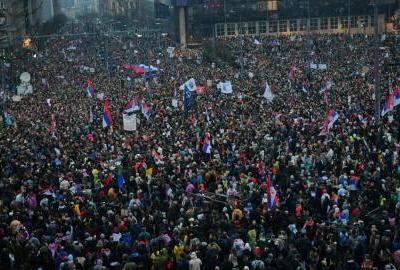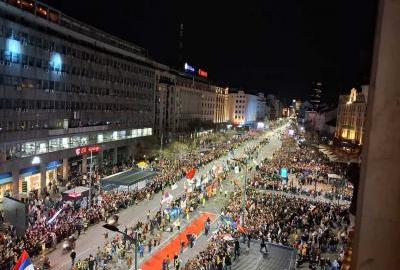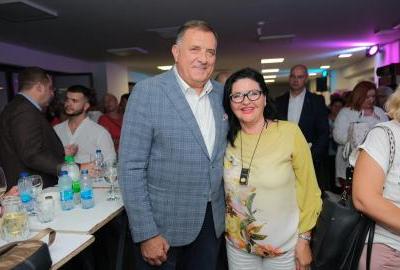Žurnal in English
RETURN OF MILITARY SERVICE IN SERBIA: The cult of the warrior tradition
Vučić's decision to return to compulsory military service, which was abolished on January 1, 2011, is just a consistent continuation of a long and disastrous tradition. Nothing else can be expected from the radical who made his political career on the hill of corpses. All this would not have happened if he had read some better books and listened to a little better music.

It is reasonable to cultivate a well-founded suspicion that Aleksandar Vučić listened to Disciplina kičme in his youth, but for some reason, the name of the album “Nova iznenađenja za nova pokolenja” (translation: "New Surprises for New Generations") is close to his heart. At the time when Koja and the team recorded and released their fourth record, in 1990 and 1991, Vučić had better things to do than listening to some rock lunatics: the Serbian people just woke up prompted by patriotic vigils of various bards of blood and soil, so they are rebelliously preparing for a new battle to expand the territory, and the young law student trained in fan groups and prepared to play an important role in another national disgrace, as an official of Šešelj's Serbian Radical Party.
The President of Serbia has various surprises up his sleeve for a generation that is growing up and dreaming of escaping from the progressive state head-on. When Đurđev's tribute - a hajduk meeting - dawned on May 6, Vučić decided to make young beardless men happy in Serbia, announcing that he would propose to the Assembly the reintroduction of compulsory military service for ninety days. And the deputies welcome Vučić's proposal calmly, by saluting and chanting the answers in unison: "I understand and it is not difficult for me!"
Furnishing a patriotic bed
The President also gave a logical explanation for his decision: "I think that this acquires responsibility, obligation, so that men gain the maturity to learn what the state is and what the army is, what patriotism is, and the attitude towards work is different, from adjusting the bed to how to respond accurately to obligations ". Responsibility is acquired in some other ways about which the president knows absolutely nothing, obligation is a sense of duty that is also not close to Vučić, because if he had a hint of that feeling, he would not destroy his own country. Maturation is not gained by military drilling, obedience training, marching in a line, unfolding a rifle and shooting at targets, but it is a long-lasting process about which radical-progressive cadres and the population living in voluntary, self-concealed immaturity have no abstract idea.
Every individual who has ever dealt with the bureaucratic rainforest and institutions that are in the service of political masters, and not the citizens who pay them, knows what the state is. A responsible attitude towards obligations is acquired in primary school, which later spills over into the attitude towards work. Famous bed-making is not exactly quantum physics or German idealistic philosophy, boys master this complicated skill while working as children. If the president only learned to make the bed in the barracks, it is no wonder that he ended up as a fan hooligan and an important screw of an evil party, it happens with educationally neglected children.
War Crimes Specialists
The young men can easily learn what the Serbian Army is by reading the verdicts of the Hague Tribunal, which condemned the commanders of this murderous army for the most horrible crimes against humanity. There has been a lot of public debate these days about Vučić's decision, about the mood of young people towards wearing uniforms, about the attitude towards the army, losing three months of life and similar topics, but few remembered the elementary fact that our army is simply criminal. What can young people learn from officers, especially from the older guard who became famous in the 1990s? How civilians are killed? How corpses are stored in cold stores, transported throughout Serbia and buried in mass graves? How the territory is ethnically cleansed? How women, children, old men and women are expelled from houses and apartments? How cities are besieged and razed to the ground? These are some of the more important skills that our army has mastered.
The militarization of the Serbian society has been going on for three and a half decades, almost without a break, the progressives have successfully followed their predecessors. Vučić has been buying weapons since he arrived, constantly threatening neighbours and announcing a new war halftime, his media are celebrating the army, intimidating the audience with the possibility of new military conflicts, spreading aggression and fighting spirit, and keeping the population in constant danger of war. In the end, we have reached the point that almost three-quarters of the citizens of Serbia support the reintroduction of compulsory military service, as shown by the research of the Belgrade Center for Security Policy from November 2020. Among the reasons cited by proponents of the barracks spirit are two: to teach young people order and discipline (63 per cent) and because it is in keeping with tradition (20 per cent).
Praising the warrior tradition
Hand on heart, the militaristic tradition is strong in Serbian society, but it is not something to be proud of, especially after the four lost wars at the end of the last century in which, as Bogdan Bogdanovic said, we "lost both soul and honour." This country has not been able to live for a long time because of the cult of war history, warrior tradition, fighters, and men with rifles in hand. As if no one has ever done anything else in our history, no one has created and built, but all the ancestors just fought. Given the dominant image of our history created by various intellectuals for special operations and the same quasi-media, it is no wonder that the glorification of war, army, barracks, and militarism has become something self-evident, so to speak, natural.
Historian Dubravka Stojanović said nicely ten years ago:
"History in Serbia, as in many other countries, is more pre-military training than science. It has the task of building national pride and shouting that we are the best. We only remember the end of the eighties and all those drills in the historical chest, when passions were inflamed by talking about the fact that others never had a state, that they are not historical peoples, that they lost all wars, that Serbs won wars… "
The latter phrase is famous, it belongs to the father of the nation, Dobrica Ćosić, it is the thesis about Serbs who win in war, and lose in peace, which has become generally accepted. I guess that should mean that we are incapable of peacetime, civilian life, that we do not know how to live in peace with others (and not even with ourselves), but we are, so solely and mentally crippled, capable only of war, destruction and killing.
Lies of patriotic poets
However, in his novelistic cabbages, Ćosić romanticized the war, beautified and made up the bloody reality. His novels have been widely read as historical literature, which speaks volumes about the local state of consciousness, reading skills and basic knowledge of literature, the audience has not yet reached Aristotle's "Poetics", let alone some authors younger than two and a half thousand years. Bogdan Bogdanović has repeatedly spoken about the pernicious influence of Ćosić's books, which expose a false, idyllic picture of military conflicts and the apotheosis of war, contrasting Dragiša Vasić's stories with the bad prose of the father of the nation and the militaristic narrative.
It is no wonder that he thought of the very early Vasić, because he also had fun with intellectuals who indulged in incitement to war and false stories about the heroic death on the battlefield. Here is how a Serbian officer in the middle of the First World War thinks in Vasić's story "Away", breaking the lies of patriotic poets to pieces:
“What do we read every day? What do patriotic poets write who, from afar, beat others to death? They write: that they wanted to die, that there was nothing sweeter for them than to die. Is that a lie? Isn’t it that everyone wants to live? ”
Do you know of any other rhythm?
Everything that is truly valuable in Serbian culture has always been directed against war, destruction and killing, from Dušan Vasiljev and early lyrics and prose by Miloš Crnjanski, through anti-war poems and stories by Rastko Petrović, to poetry by Mišo Stanisavljević, Ibrahim Hadžić, Predrag Čudić and Milan Milišić, to name just a few notable authors. Vučić and his lackeys such as Aleksandar Vulin, Ivica Dačić, Nebojša Stefanović, Nikola Selaković and hundreds and thousands of other deluded souls are offshoots of another tradition, warrior, militaristic, nationalist, the worst that Serbian culture has given, and which is embodied in the works of Dobrica Ćosić and his memorandum circle, which prepared the entire war project.
Vučić's decision to return to compulsory military service, which was abolished on January 1, 2011, is just a consistent continuation of a long and disastrous tradition. Nothing else can be expected from the radical who made his political career on the hill of corpses. All this would not have happened if he had read some better books and listened to a little better music.
Maybe he would hear the musician say to him: One, two, three, four, five, six, seven - I have been standing and watching you carefully for years. One, two, three, four, five and six, will I ever hear good news from you? Do you know of any rhythm other than that of playing the war drum alongside war marches?
(zurnal.info)








